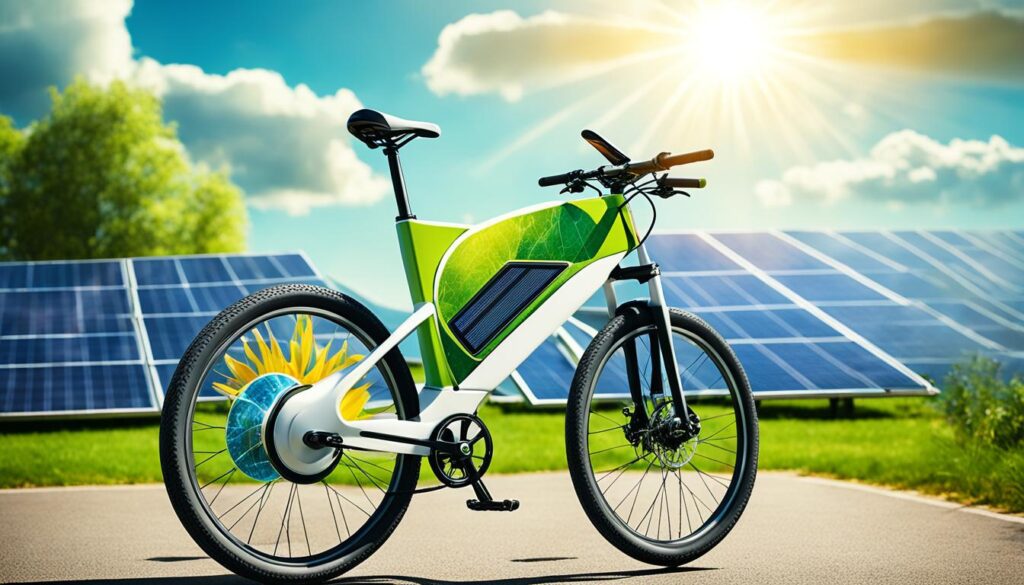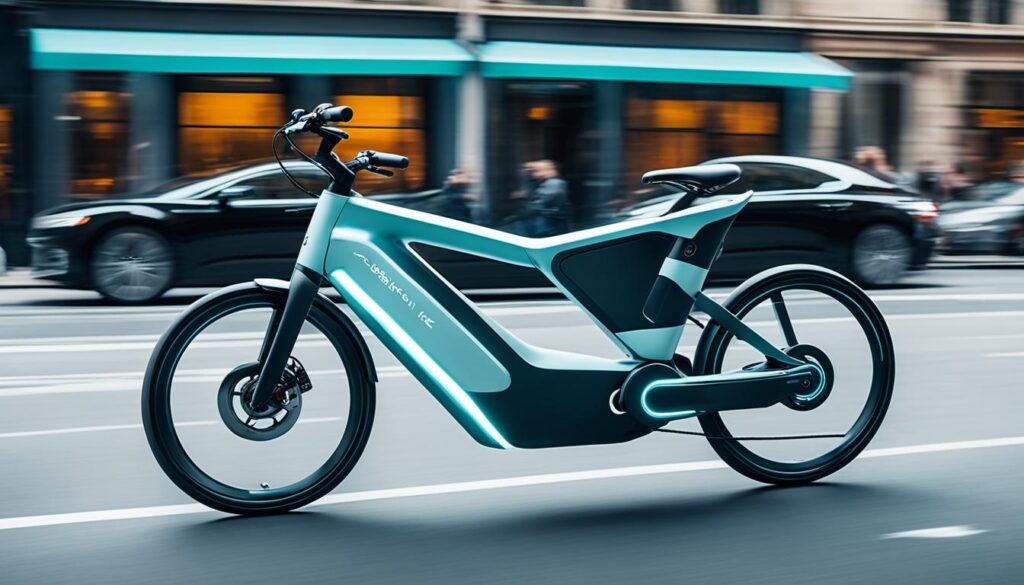Imagine cruising on your bike, powered by the sun. This dream is now a reality with solar-powered electric bikes. These bikes make transportation eco-friendly. They use renewable energy, making electric bicycles more sustainable.
Solar-powered electric bikes are changing the way we think about renewable energy cycling. These e-bikes mix traditional pedaling with solar power. It’s a step toward a greener future, one ride at a time.
Key Takeaways
- Solar-powered electric bikes offer a cutting-edge form of eco-friendly transportation.
- They leverage renewable energy for cycling, enhancing sustainability.
- These bikes are transforming the concept of renewable energy cycling.
- The use of solar energy makes electric bicycles more sustainable.
- Solar-powered electric bikes provide a glimpse into a greener future.
Introduction to Solar Powered Electric Bikes
Innovative solar-powered electric bikes are revolutionizing the commuting landscape. They blend green technology with alternative energy sources for bikes. These solar e-bike systems are a fun, eco-friendly option for getting around the city.
Solar panels on these bikes are rated in watts. They function at 75-85% efficiency in full sunlight and 10-50% in cloudy weather. For good performance, a 200 watts or 1m² panel area is needed to charge well.
Each Sunpower Maxeon cell adds about 3.6 watts of power. It produces roughly 6 amps of current. Genasun charge controllers can handle up to 8A max, and certain MPPTs can manage up to 15A. Panels can be set up separately or together, using specific wiring methods.
An interesting feature of some vehicles is the V3 Cycle Analyst. It lets users watch the solar charging current and the amp-hours on a special Solar Current Sense. You can attach solar panels in different ways. Options include bike trailers, solar roofs, racks, or foldable setups. This makes it adaptable for many types of rides.
Solar power systems work by turning sunlight into electricity. Then, this power charges the electric bike’s battery. The effect depends on the sun’s strength, the size of the panels, and the bike’s battery size. Usually, home solar panel systems need 100 to 600 square feet of space. Sunny areas like the southwestern U.S. get about 6-7 peak sun hours a day, which is ideal for solar charging.
The energy use of an electric bike is typically between 0.1 to 0.5 kWh a day. Yet, it’s important to keep solar panels clean to avoid losing efficiency, which can happen at a rate of about 0.5% per year. The future looks bright with new advancements in solar bike tech, bigger batteries, and more investments. These will create cleaner ways to commute.
| Expense Breakdown | Cost ($) |
|---|---|
| Permitting and Installation | 20,600 |
| Installation Administration (30%) | 6,030 |
| Sales Tax (8.8%) | 1,800 |
| Total Estimated Cost | 28,430 |
| Requested funds from CSF | 23,430 |
| Non-CSF Source (Clean Energy Prize) | 5,000 |
Key Features and Benefits of Electric Bikes
Electric bikes are storming the globe, blending cutting-edge tech with eco-friendliness. We’ll explore the standout features and big advantages of owning an electric bike.
Performance Specifications
The speed of high-performance electric bikes is remarkable. Top models can hit speeds over 60 mph. This is thanks to their strong motors, some offering up to 10000W of power. Their long-lasting batteries, like the 72V 45Ah LG, let riders enjoy longer trips.
They often use carbon fiber frames. This makes them light yet tough. The design keeps the bike sturdy but easy to handle. Plus, adjustable suspensions from Taiwan make rides smoother, no matter the terrain.
Environmental Impact
Electric bikes help in making transportation greener. By choosing e-bikes, car owners can cut down on car travel. This significantly lowers carbon emissions.

These bikes also don’t produce harmful gases. This makes them a key player in using renewable energy for city travel. It’s a step towards cleaner air and saving the environment.
Long-Distance Travel with Solar Energy
Solar-powered electric bikes are making long trips a reality. There are stories of riders going from Southern California to Alaska. They show us how solar charging opens up new travel possibilities.
With solar power, the journey can stretch further without needing regular charging spots. This innovation shows how renewable energy can change transportation. It makes long e-bike trips more doable.
“Electric bike riders’ hearts can work at over 90% of the level of riders on non-assisted bikes, with participants reaching 94% of their average heart rate while riding pedal-powered on a test circuit.”
| Specification | Details |
|---|---|
| Top Speed | 60+ mph |
| Battery Type | 72V 45Ah LG |
| Motor Power | Up to 10000W |
| Frame Material | Carbon Fiber |
| Suspension System | Adjustable Taiwan Suspension |
Electric bikes combine great performance, environmental benefits, and long-range travel. These features not only encourage a healthier life but also offer a green answer to travel challenges.
Conclusion
Exploring electric bikes’ future, using solar power could change cycling big time. These bikes are eco-friendly and support energy-independent trips. They can go up to 15.5 mph and travel 40 to 75 miles on one charge, making them perfect for daily commutes and adventure.
Solar tech in e-bikes shows how renewable energy can make them more sustainable. Even though they’re heavier, up to 25 kg, the long travel range and low upkeep make them a smart choice. They’re also cost-effective since there’s no gas, expensive insurance, or parking fees involved, benefiting students and city riders.
Solar e-bikes could be the new step in clean travel. They can go farther on one charge and be easily charged at home overnight. As more people look for sustainable ways to move, solar e-bikes could help lower carbon emissions and promote energy independence. They combine the excitement of modern tech with the efficiency of eco-friendly travel.



